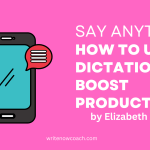Writers@Work: Copywriting for Fun and Profit by Joel Habush
Today’s guest post comes from Joel Habush, an award-winning copywriter. I met Joel a few years ago when we sat on a panel about making money from writing. I immediately knew that if I wanted to learn about copywriting, this was the guy to talk to. Thankfully, he agreed to share his wisdom with all of us. Read and learn, friends!
 Writers@Work: Copywriting for Fun and Profit by Joel Habush
Writers@Work: Copywriting for Fun and Profit by Joel Habush
Just sit down to the computer, come up with a really clever headline; support it with equally clever subheads and body copy; send it off, get an enthusiastic response from the client; fax or email your invoice; and sit back and work on your novel, while waiting for that fat check.
Sometimes it really happens that way.
So, how do you get it to happen for you?
Simple. But it ain’t easy.
There are two things a freelance advertising copywriter is concerned with:
1. How to do the job.
2. How to get the job.
Many freelance writers, new to the field, are more concerned with the latter, and I really think that’s putting the cart before the horse. (Nothing wrong with using clichés if they work.)
Most freelance copywriters who I know graduated from college with a degree in journalism or communications, or a major in English. They then went to work full time at an ad agency or in a company’s corporate communications department. After a few years, making their bones, they decided to pursue the life of a full time freelancer. (Sometimes the decision was made for them in an untimely manner—they were “downsized,” Corporate Speak for “kicked to the curb.”)
Of course you don’t have to go the formal education route. While one who wants to be a doctor or a lawyer has to graduate from doctor school or lawyer school, there’s no law that says a copywriter has to go to copywriter school…but it helps.
Writers who are not taking the traditional educational route today find it a lot harder to get going as a freelancer, but it can be done.
If you’ve never done any copywriting, you should familiarize yourself with exactly what will be expected of you. I’d recommend Confessions of An Advertising Man by David Ogilvy to get “The Big Picture.”
There are tons of How To books on Copywriting, one of which, The Adweek Copywriting Handbook—The Ultimate Guide to Writing Powerful Advertising and Marketing Copy from One of America’s Top Copywriters, by Joseph Sugarman, might be a helpful start.
Finally, here are some questions you have to ask your client, her Ad Manager, or yourself.
*What’s the purpose of the piece?
*Who’s the audience?
*What’s the competition saying?
*How much space do I have for how many words in a print ad?
*How much time do I have for this radio or TV commercial? (Figure on about 2 ½ words per second.)
*What Voice should you use?
Rules for Writing Web Content
The Internet (seemingly) is sucking the life out of other media, hence out of alternate opportunities for copywriters. Most clients want to know if you can write web content. You can.
Rule Number One. Google “Rules for Writing Web Content.”
Go to a few of the sites. You’ll see a commonality of advisories, e.g., “Incorporate attention getting headlines;” “Use subheads within the body;” “Use bullets;” ”Keep your voice consistent;” “Write concise sentences;” and “Add calls to action.”
Some scary web-writing lingo can be learned easily. Don’t be put off by words like “Spiders,” “Search Engine Optimization,” and “Keywords.”
Go to a good workshop or seminar. I just signed up to attend a FREE workshop, myself, put on by Northwoods Software; I’ve gone to several of their workshops and have always taken away valuable information.
Let the Internet Do Your Job Search For You
Internet sites let you search for work while working on your laptop. You simply hit “save” for the latest version of your novel, turn the other cheek on the coach, and visit some of the sites below:
Linkedin. Social Media can help. If you’re already established on Linkedin, post to this extended and hopefully extensive group of potential clients or referral sources. Say you are now actively seeking copywriting projects, and ask for referrals.
Facebook. Use it for more than telling people how the refs robbed the Packers of a game. Let friends and family (and friends of friends, and families of family) know that you’re looking for referrals. Ask them to let you know of any possible leads. Then when you get responses, you pick up the phone and call your contact and ask him to turn the lead into a referral by calling the prospect and telling her about you, and then to find out if she’d be interested in getting a call from you.
Your Website. Don’t have one? Get one. Your nephews and nieces have had their own since they were twelve! On there, even your stating your background and whatever experience you have will show your writing ability.
Content Mills. This is a somewhat pejorative appellation for Internet sites that act as clearinghouses for clients and freelance copywriters to get together on projects. If you want to experience what “a mere pittance” really means, you’ll soon find out. Most full time freelancers eschew these sites, but if you need samples to get more business, while picking up some “walking around money,” why not go for it? And you may find the rose among thorns—a gig that pays decent money, one which will also result in your having a respectable sample to add to your growing portfolio.
http://www.freelancer.com/jobs/Copywriting/
http://www.online-writing-jobs.com/jobs/freelance-copywriting-jobs.php
http://jobs.monster.com/v-editorial-q-copywriter-jobs.aspx
Want me to evaluate each one of these for you? Sorry. You’ll have to do the research. You can register on most of these for free, and most of them take a cut of your check before you ever see it.
BEFORE THERE WAS SOCIAL MEDIA, THERE WAS LIVE PERSON NETWORKING
This takes a little more legwork, face time, and involvement of various other body parts; this is not for the dilettante. It’s for making a little more “serious money.”
Business Networking international. There are plenty of business networking groups, each geared in some fashion for members to give each other solid referrals for new business. BNI is the largest one in the world, and has a chapter near you.
Working Writers of Wisconsin. While Membership is restricted to those who have been full time professional business communications freelancers for more than a year, programs open to Associate Members can teach you more about copywriters and their craft, Associate Membership is free.
Visit the website and you’ll see the fields in which copywriters toil, their diverse backgrounds, work samples… and their pride as professionals, shining through.
United Adworkers, Local 208. You can join this group, attend some of their programs or fun events, and network away. As stated on its website, “We are a close knit group loosely made up of advertising practitioners, designers, directors, photographers, production professionals, students and anyone else interested in the fine art of propaganda.”
Non–Profits can be profitable…for you. Contacting a charity in which you believe can help everyone. Offering to donate your writing skills to help with newsletters, flyers, ads, public service announcements, etc., can benefit the charity, arm you with samples of your copywriting to wow the next prospect, and warm the cockles of your heart.
Happy hunting.
About the author. Joel Habush, Copywriter/Producer, has been freelancing for more than 20 years, and has won numerous awards at advertising agencies in Milwaukee and Chicago as a writer, producer, and creative director. He’s also been a partner in a creative boutique and in an advertising agency in Milwaukee.
Joel’s been a writer for as long as he can remember, honing his writing skills while earning a Bachelor of Journalism degree at the University of Missouri. Joel has written and produced television commercials in Milwaukee, Chicago, Green Bay, Minneapolis, Louisville, and Tallahassee; and written and produced jingles in Milwaukee, Chicago, Vancouver, and Nashville. His areas of expertise in print, broadcast, and videos include, but are not limited to, consumer, health care, industrial (non technical), business-to-business, and retail.
Bringing “The Joel Habush Difference” to every assignment, he’s been helping companies with branding since before the term became popular.














